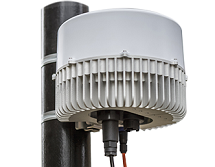Cambridge Communication Systems has deployed a self-organising small cell microwave backhaul system for China Mobile.
The small cell network is one of China Mobile’s first outdoor deployments of 4G LTE-TDD small cells.
The new network, according to the Cambridge based wireless vendor, is now carrying live 4G traffic and the network dynamically reconfigures and scales to connect further small cells in surrounding areas.
“CCS’s CE-marked, self-organising backhaul nodes were deployed by local lighting contractors in only 15 minutes per site, without training or the need to perform complicated frequency planning or alignment, delivering immediate and optimal 4G coverage to China Mobile subscribers,” CCS said in a statement.
The vendor added that China Mobile’s network will be able to provide high capacity, low latency, carrier-class availability and high QoS to its LTE small cells. The technology has already been implemented and is now carrying live LTE traffic in China.
A single unit connects to other units to create a multipoint-to-multipoint network that self-organises into the most optimal topology, without the requirement to post-optimise. The locations consist of a single CCS node together with a single or dual small cell, forming a 4G/LTE Macro and small cell HetNet (heterogeneous network).
CCS CEO Steve Greaves commented: “Our self-organising, self-healing nodes are able to be very swiftly and flexibly deployed by relatively untrained contractors – without any upfront frequency planning or optimisation – saving both time and money while delivering the high levels of capacity, latency and redundancy demanded by China Mobile.”
Mobile operators are increasingly turning to small-cell architectures to improve capacity and coverage on their networks and reduce networks costs.
In a new report, market research firm Dell’Oro Group said that the mobile backhaul equipment market – consisting of transport equipment as well as routers and switches – will reach €5.8 billion by 2018.



